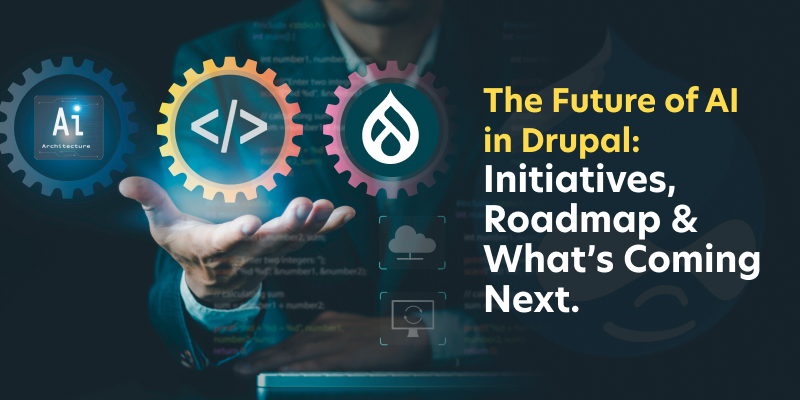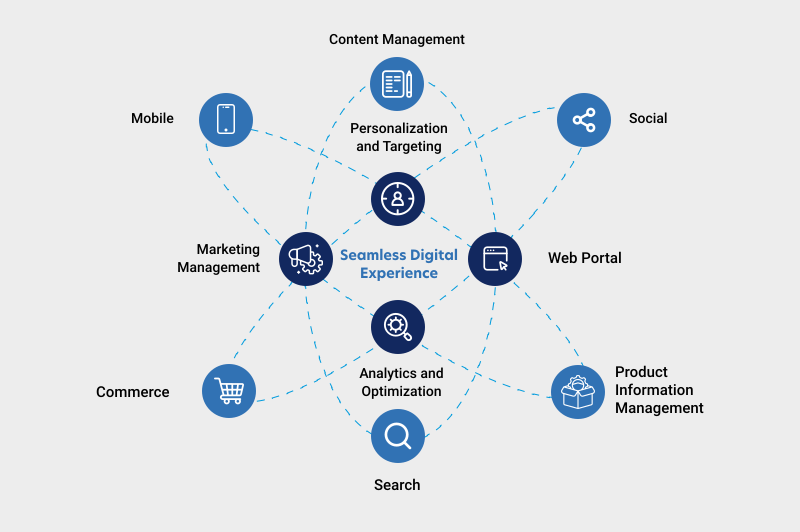The Future of AI in Drupal: Initiatives, Roadmap & What’s Coming Next.

Bridging Intelligence and Enterprise Content
Drupal has long been recognized for its scalability, flexibility, and security. Yet, even for seasoned teams, managing complex sites can feel cumbersome—content creation, personalization, and search optimization often require manual effort. This leaves organizations with an intelligence gap: the platform is capable, but not predictive; robust, but not adaptive.
Integrating AI into Drupal addresses this gap. It turns a traditional CMS into an intelligent, responsive, and enterprise-ready platform, enabling teams to create content faster, engage audiences more effectively, and optimize operations. For organizations seeking measurable ROI, this isn’t just a trend—it’s a strategic evolution of the platform.
Why AI and Drupal Make Strategic Sense
AI isn’t merely an enhancement—it solves persistent operational challenges in enterprise Drupal deployments:
- Simplifying Complexity: Drupal’s flexibility can be a double-edged sword. AI guides site setup, recommends modules, and proposes content structures.
- Automating Routine Workflows: Tasks like taxonomy management, SEO updates, and metadata tagging are automated, freeing editorial teams for strategic initiatives.
- Improving Content Quality: AI suggests headlines, recommends internal links, and assists with translations, ensuring content is relevant, consistent, and optimized.
- Future-Proofing Digital Presence: AI allows Drupal sites to evolve with user expectations, search engines, and content trends without costly overhauls.
Drupal AI Initiatives
Drupal’s AI journey is built on modular innovations and community-driven projects, ensuring intelligence integrates seamlessly into the platform.
AI Integration Framework
The AI Integration Framework provides the foundation for connecting Drupal to external AI services. Supporting providers like OpenAI, Anthropic, and Google Gemini, it allows enterprises to deploy AI features for text, image, and audio processing while remaining flexible and scalable.
Content Intelligence Modules
Modules focused on content intelligence are transforming editorial workflows:
- Content Suggestions: AI recommends topic ideas, headlines, and structure improvements.
- Translation & Localization: Automated support for multilingual content without losing context or brand voice.
- Content Summarization: Generate metadata, SEO-friendly snippets, and summaries automatically.
These modules enable teams to create high-quality content quickly while maintaining consistency and accuracy.
Automation Agents
AI Agents automate maintenance, workflows, and configuration:
- Monitor site performance and provide optimization suggestions.
- Tag content and enforce taxonomy compliance.
- Guide editorial teams on workflow priorities based on engagement patterns.
Smart Search and Recommendations
AI enhances Drupal’s search and personalization capabilities:
- Semantic search for intent-aware results.
- Adaptive recommendations based on user behavior.
- Dynamic content ranking to improve engagement and conversions.
The Roadmap Ahead: AI and Drupal Advancements

Drupal’s future is being shaped by the convergence of AI innovation and core platform evolution. These developments aim to create a CMS that is smarter, faster, more adaptable, and easier to manage, addressing both the intelligence gap and enterprise-scale requirements.
Smarter, Predictive Experiences
AI will allow Drupal to anticipate user needs rather than simply react. Key capabilities include:
- Predictive content delivery based on real-time engagement patterns.
- Dynamic user journeys that adapt layouts and recommendations as users interact.
- Personalized A/B testing suggestions driven by AI analytics, automatically optimizing engagement.
These AI-driven features integrate with Drupal’s component-based authoring system, letting content teams deliver tailored experiences without rewriting templates or redesigning pages.
Intelligent Authoring and Content Management
Content creation is becoming more intuitive and automated:
- AI-assisted editing provides guidance on structure, readability, and SEO compliance.
- Automated metadata, schema, and accessibility checks ensure content is optimized across channels.
- Personalized A/B testing suggestions identifies missing or underperforming content, guiding high-impact improvements.
By combining AI insights with reusable Drupal components, organizations maintain brand consistency while reducing manual effort.
Enhanced Developer and Integration Tools
Future Drupal releases will use AI to improve development efficiency:
- AI-powered code recommendations and predictive testing reduce errors and accelerate cycles.
- Smart dependency management identifies modules that may cause conflicts, minimizing technical debt.
- API-first, decoupled architecture enhancements allow AI-driven features to integrate with CRM, analytics, or marketing automation systems.
These improvements make Drupal not only smarter for end-users but also more resilient and scalable for developers and administrators.
Optimized Performance and Governance
Platform and AI advancements together improve operational stability:
- Intelligent caching, content delivery, and analytics improve speed and Core Web Vitals automatically.
- Governance and automated monitoring ensure AI modules, personalization, and integrations comply with accessibility, security, and performance standards.
The synergy of AI and platform upgrades positions Drupal as an intelligent CMS and enterprise-grade foundation, capable of meeting complex organizational needs.
Enterprise Value: Tangible Benefits

Organizations integrating AI with Drupal can achieve measurable impact:
- Faster Time-to-Market AI-guided workflows accelerate site deployment and content publication.
- Operational Efficiency: Automation reduces manual work and lowers operational costs.
- Higher Engagement: Personalized content improves audience interaction and conversion.
- Data-Driven Insights: Analytics provide actionable intelligence on user behavior and content performance.
- Peace of Mind: AI-driven monitoring maintains performance, security, and compliance automatically.
This approach ensures that enterprises leverage Drupal not just as a CMS, but as a strategic digital platform.
Challenges and Considerations
While AI integration is transformative, enterprises must consider:
- Data Privacy: Compliance with GDPR, CCPA, and other regulations is critical.
- Bias Mitigation: Ensure AI recommendations are fair, inclusive, and transparent.
- Infrastructure Planning: AI workloads require performance tuning to avoid bottlenecks.
- Workflow Adaptation: Teams need training to effectively use AI-assisted tools.
Proactively addressing these challenges ensures AI delivers consistent value without introducing risks.
Drupal’s Intelligent Future
AI is no longer optional, it is central to Drupal’s evolution. Drupal is becoming a predictive, adaptive, and enterprise-ready CMS by combining AI innovations, intelligent modules, and platform enhancements.
For organizations seeking to optimize content workflows, increase engagement, and future-proof their digital presence, embracing AI in Drupal is a strategic imperative.
The next generation of Drupal is not just flexible, it is intelligent, capable, and ready to support complex, high-impact digital experiences. Get started now!